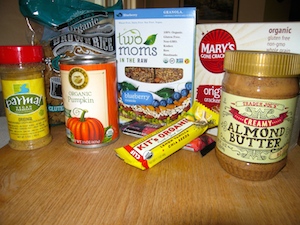When we hear the term “processed food” the first thing that comes to mind is the obvious, junk food. However, not all processed foods are bad for you.
What makes a food processed is that it has been prepared or treated by either a mechanical or chemical method that increases its shelf life (canning, dehydration, the addition of preservatives), changes it into something new (grains to flour to bread, transforming raw vegetables into soup), or improves its flavor, color and/or texture (adding sweeteners, artificial flavors, thickners).
Mechanical processing includes the use of machines to change the form of a food so it can be more easily consumed, transformed into another product, or preserved (such as baby carrots, bread, or dehydrated fruit). Chemical processing includes adding artificial substances and refined products in order to extend a food’s shelf life, improve flavor, color, and/or texture, or increase nutritional value (such as in cereals, crackers, granola bars, protein drinks, candy).
We’ve been told that the goal in a healthy diet is to significantly reduce our consumption of processed foods. But with advances in technology came advances in food preparation and preservation. Our grocery stores are stocked full of convenience items that make meal prep and cooking quick and easy. Our society relies heavily on the convenience of processed food, helping us to create meals on the go and in between the obstacle course of our hectic daily lives.
Unless you have endless amounts of time to cook farm fresh foods from scratch every day, it’s unrealistic to eliminate all processed foods from your diet. That’s why it’s important to understand why you need to choose carefully before you buy. It’s not the fact that the food is processed, as much as how it was processed and what has been added to it.
The food industry is always looking for ways to make their products more enticing so we will buy more of them. They engineer their products using additives and other chemicals to improve the appearance, flavor and texture so that consuming them becomes “rewarding” to our brain, making it very difficult for us to give them up. Chemically processed foods can become so “rewarding” that we are compelled to eat more and more.
In addition to the addictive and enticing nature of processed foods, food manufacturers strategically use misleading phrases like “all natural” and “cholesterol free” to make you think what they are selling is healthy. Be wary of false advertising. Though their product may contain one item that is known for being “good for the heart”, what they aren’t telling you about is the additives that have been included in order to make their product taste good.
Here are some terms to watch out for:
All natural – this term has not been defined by the Food and Drug Administration, leaving a lot of room for interpretation. Although manufacturers are not allowed to use added colors, artificial flavors, or “synthetic substances” in products labeled “all natural”, they can still include preservatives or unhealthy sweeteners such as high fructose corn syrup.
Cholesterol free – this product is not free of cholesterol. The term only means that there must be less then 2 mgs per serving of cholesterol. A product labeled “low-cholesterol” must contain less then 20 mg.
Made with real fruit – products are not required to list the actual percent of real fruit and, in some cases, the product may not even contain the “real fruit” pictured on the box.
Multigrain – a product using this term most likely includes refined grains (grains that have been stripped of their most important nutrients) instead of whole grains. Even if the product looks more hearty with that dark earthy color, some manufacturers actual add carmel coloring to create the impression of a more healthy food product.
No sugar added – this term does not mean the product is sugar free. Watch out for the sugar that is already naturally occurring in the ingredients and the carbohydrates that raise your blood sugar once eaten.
Sugar free – a product using this term most likely contains sugar alcohols. Common sugar alcohols are mannitol, xylitol, or sorbitol. Over consuming sugar alcohols can cause diarrhea.
Zero trans fat – this term does not actually mean there are “0” transfats in the product. It is just required to contain less then .5 grams per serving.
So how do you tell if one of your favorite convenience foods is healthy? Understand how to read the ingredient labels and remember this basic rule; if you can’t pronounce it, never heard of it, or you wouldn’t cook with it at home, don’t eat it.
We are very careful about the processed foods we buy. Some of our favorites are:
- Mary’s Gone Crackers
- Trader Giotto’s Organic Tomato Basil Marinara
- Trader Joes’ Organic Brown Rice-Quinoa Pasta
- Two Moms in the raw granola bars
Learn more:
- Authority Nutrition’s article, “9 ways that processed foods are killing people”
- Pbs Video: “Is Processed Food a Pandora’s Box for the American Diet?“
- Health.com, “16 Most misleading food labels“
- TedTalk Videos, “What’s wrong with our food system?“
- US News article, “Is all processed food unhealthy?”
- Congressman Tim Ryan’s book, The Real Food Revolution

